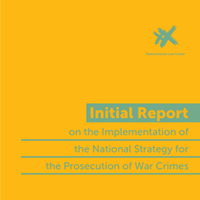Initial Report on the Implementation of the National Strategy for War Crimes Prosecution
 The Humanitarian Law Center (HLC) has been monitoring and providing support to war crimes trials since the first war crimes proceedings conducted in Serbia in 2002. The HLC is the only organization that has been continuously monitoring and analyzing war crimes trials in Serbia and informing the public at home and abroad about them. It has been representing victims in war crimes cases through an attorney, filing criminal complaints with the Office of the War Crimes Prosecutors (OWCP) against suspected perpetrators, and sharing its documentation on war crimes.
The Humanitarian Law Center (HLC) has been monitoring and providing support to war crimes trials since the first war crimes proceedings conducted in Serbia in 2002. The HLC is the only organization that has been continuously monitoring and analyzing war crimes trials in Serbia and informing the public at home and abroad about them. It has been representing victims in war crimes cases through an attorney, filing criminal complaints with the Office of the War Crimes Prosecutors (OWCP) against suspected perpetrators, and sharing its documentation on war crimes.
Relying on its intimate knowledge of the subject of war crimes prosecutions in Serbia, acquired over a number of years, during 2013 and 2014 the HLC carried out research into key aspects of the work of institutions specialized in the prosecution of war crimes and the problems in their work during the first ten years of their existence. The findings of the research were presented in the publication, “Analysis of the Prosecution of War Crimes in Serbia 2004-2013“. On the basis of the Analysis and a series of consultative meetings with representatives of government authorities and other relevant stakeholders, the HLC in 2015 published a Model Strategy for the Prosecution of War Crimes Committed during and in relation to the Armed Conflicts in the former Yugoslavia.
The National Strategy for the Prosecution of War Crimes, a document that the Government of the Republic of Serbia adopted in February 2016, is based, among other things, on the Model Strategy developed by the HLC. Given the fifteen years of the HLC’s active engagement in monitoring war crimes, but also the HLC’s long-time advocacy for the adoption of a national strategy and addressing the key problems in the areas covered by it, the HLC has a unique capacity to monitor its implementation, and will exercise this capacity throughout the period of implementation, until 2020.
This is the first report on the implementation of the National Strategy. The HLC’s research and findings show that in the one and a half years since its adoption, no significant progress in war crimes prosecutions can be reported. Quite the reverse: the situation has, in some respects, worsened even further. Not only has implementation started with an enormous delay, but some key activities have not yet been implemented at all. The prosecutorial strategy has not been adopted, only eight indictments have been raised, war crimes trials continue to be unduly delayed, no progress has been made regarding victims’ procedural rights, the search for missing persons continues to be inefficient, cooperation with the ICTY has been discontinued, and the relevant international governmental and non-governmental organization have negative opinions about Serbia’s progress in the prosecution of war crimes.
The HLC thinks that Serbia’s evident regression in war crimes prosecution and in dealing with the past clearly demonstrates that adopting a national strategy on its own is not enough to solve the numerous continuing problems in this area. Without genuine commitment and political will, all reforms are doomed to failure and the problems identified will remain unsolved. The HLC wishes to draw attention to the fact that unless some critical steps are taken immediately, the National Strategy will until its expiry in 2020 remain a mere dead letter.
Initial Report on the Implementation of the National Strategy for War Crimes Prosecution is available here.








